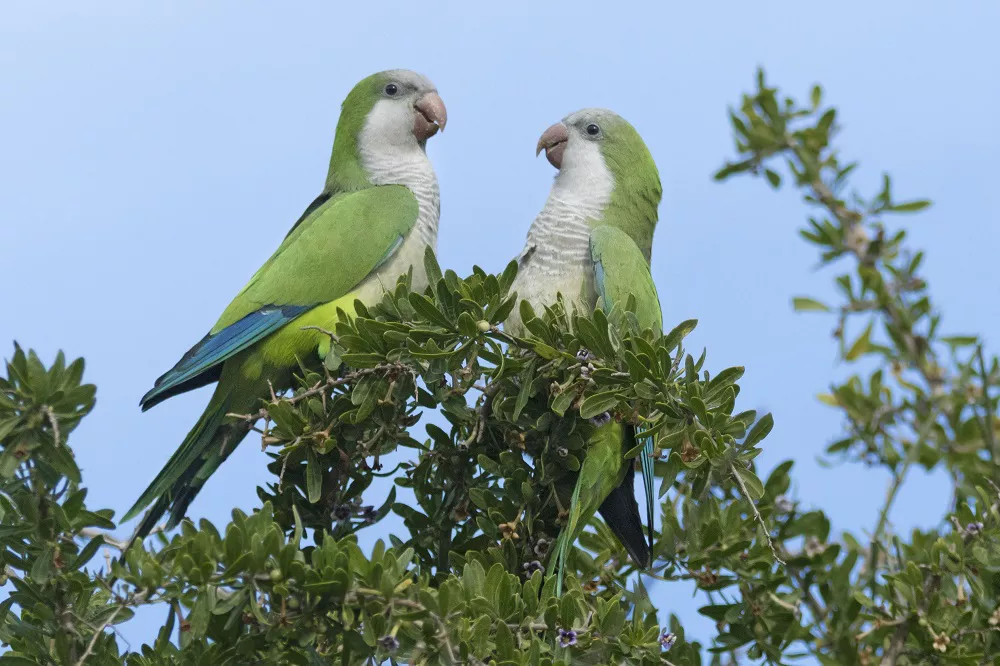Quaker parrots, also known as monk parakeets (Myiopsitta monachus), are small, intelligent, and social birds. They are loved by many bird owners for their charm and ability to mimic human speech. However, despite their popularity, quaker parrots are banned or restricted in many U.S. states and countries around the world.
This may seem strange. After all, how could such a small and cheerful bird cause legal issues?
In this article, we will explore why quaker parrots are illegal in some places. We will look at their behavior, their impact on the environment, and the laws that govern them.
What Is a Quaker Parrot?
Quaker parrots are small to medium-sized parrots, usually 11 to 12 inches long, with bright green feathers, grayish foreheads, and pale underbellies. Their intelligent nature allows them to learn tricks and words, making them popular companions for bird enthusiasts.
- Quaker parrots Origin: South American countries, especially Argentina, Brazil, and Uruguay.
- Quaker parrots Personality: Social, playful, and known for forming strong bonds with their owners.
- Quaker parrots Lifespan: 20 to 30 years in captivity.
Why Are Quaker Parrots Banned?
There are several reasons why quaker parrots are banned or restricted. The main concerns are:
1. Agricultural Threats
Quaker parrots can be a major threat to crops. In their native countries, they are known to damage grain fields, fruit orchards, and vegetables. When they escape into the wild in non-native areas, they can cause similar problems.
Farmers worry that large flocks of wild quakers will:
- Eat and ruin crops
Decrease food production - Cause economic losses
For example, in Florida and Texas, wild populations of quaker parrots have been known to attack cornfields and citrus groves. In some parts of South America, quakers are considered a serious agricultural pest.
2. Invasive Species Concerns
An invasive species is a plant or animal that spreads into a new environment and harms local wildlife or ecosystems. Quaker parrots are considered invasive in many areas outside their native range.
Why are quakers considered invasive?
- They adapt well to cities and suburbs.
- They breed quickly.
- They compete with native birds for food and space.
Once a few escape or are released, they can establish wild colonies. In cities like Chicago, New York, and Miami, wild quaker flocks have already become established.
This is a problem because:
- They may outcompete native birds.
- They can spread disease.
- They disrupt natural balance in ecosystems.
3. Large, Communal Nests
Unlike most parrots that nest in tree holes, quaker parrots build large, stick-based nests. These nests can house multiple birds and can grow very large—sometimes weighing over 200 pounds!
They often build nests:
- On utility poles
- On cell towers
- On roofs and ledges
- On man-made structures like stadium lights
These nests pose serious risks:
- Fire hazard: Nests on power lines can short-circuit and start fires.
- Power outages: In some states, quakers have caused blackouts.
- Structural damage: The nests can be very heavy and cause damage to buildings and infrastructure.
Utility companies often spend large amounts of money and time removing or relocating these nests.
4. Difficulty in Control
Once quaker parrots form a wild population, they are very hard to remove. Trapping and relocating them is time-consuming and costly.
They breed often, are intelligent, and can quickly adapt to different environments.
Governments worry that allowing pet ownership could lead to more escapes and more wild colonies.
So, to prevent this from happening, they decide to ban or heavily regulate the birds before they become a larger problem.
See Also: Can Quaker Parrots Talk?
Where Are Quaker Parrots Illegal?
Laws vary from state to state and country to country. In the United States, the following are some examples:
| State | Legal Status | Restrictions |
| California | Illegal | Complete ban |
| Colorado | Illegal | Complete ban |
| Connecticut | Restricted | Owning allowed, breeding/sale banned |
| Georgia | Illegal | Complete ban |
| Hawaii | Illegal | Complete ban |
| Kentucky | Illegal | Complete ban |
| Pennsylvania | Illegal | Complete ban |
| Rhode Island | Illegal | Complete ban |
| Tennessee | Illegal | Complete ban |
| Wyoming | Illegal | Complete ban |
| New York | Restricted | Must band/register |
| Virginia | Restricted | Must band/register |
| Ohio | Restricted | Flight feathers must be clipped |
What Happens if You’re Caught With a Quaker Parrot Where They’re Illegal?
Legal consequences can be serious:
- Fines: These may range from $1,000 to $1,500 or more depending on the state.
- Confiscation: Authorities may seize and relocate or, in rare cases, euthanize the bird.
- Legal Records: Owning a banned species may result in a misdemeanor charge.
In many cases, the authorities focus on owners breeding or selling Quaker parrots, rather than individuals with a single pet. Still, purchasing, displaying, or openly breeding these birds in restricted states is risky and not recommended.
Conclusion
Quaker parrots are intelligent, charming, and affectionate, making them a favorite among pet enthusiasts. However, their adaptability, rapid breeding, and toughness have turned them into an invasive species in places outside their native habitat. They can cause widespread agricultural loss, damage power infrastructure, and outcompete native birds, prompting several states and countries to restrict or ban their ownership.


 Facebook
Facebook  Instagram
Instagram  Youtube
Youtube 